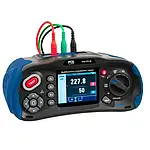
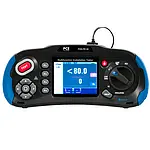
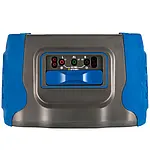
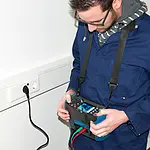
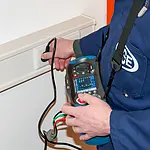
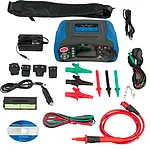
Bilingual Technical Support (EN / ES)
Public Service, Military and First Responder Discount
30 Day Return Policy
2 Year Warranty
Free Standard Shipping (US)
The PCE-ITE 50 is a robust installation tester with a large 3.5" TFT color LCD display. The installation tester PCE-ITE 50 also offers, in addition to the various measuring modes such as insulation resistance, grounding resistance, loop impedance, voltage, low-impedance measurement and RCD test with the camera function, the possibility of documenting suitable photos with the measurements. With the installation tester PCE-ITE 50, you can ensure that fixed installations are safely and correctly installed. Thanks to the dual display, the intuitive symbols and the high viewing angle, you can comfortably and quickly perform your measurements with the PCE-ITE 50 installation tester. With the low-resistance measurement of the PCE-ITE 50 installation tester, you can check grounding conductors, potential equalization rails and protective conductors for low impedance.
The measuring range for low-resistance measurement with the installation teser PCE-ITE 50 is in the range of 0 - 2000 Ω with a resolution of 0.001 - 1 Ω. Probably the most important measurement of the installation tester PCE-ITE 50 is the measurement of insulation resistance. Electrical cables are placed under voltage during the insulation measurement in order to detect fault currents, Which generate material migration or heat. In most cases, these current faults are so minimal that they are not detected by protective devices and in the worst case they can lead to a fire. The installation tester PCE-ITE 50 can carry out installation measurement with a test voltage of 125V, 250V, 500V or 1000V. The load current is in each case 1 mA. The PCE-ITE 50 installation tester is independent of the mains supply. In order to bring all systems and circuits of a power supply system to a common potential (ground reference or potential reference) and to protect against short-circuit currents and overvoltages, the earthing resistor should be as low-impedance as possible. With a measuring range of 0 ... 2000 Ω with a resolution of 0.01 ... 1 Ω, the installation tester PCE-ITE 50 offers all the prerequisites for a meaningful measurement of the grounding resistance.
|
|||||||||||||||||||||||||||||||||||||||||||||||||||||||||||||||||||||||||||||||||||||||||||||||||||||||||||||||||||||||||||||||||||||||||||||||||||||||||||||||||||||||||||||||||||||||||||||||||||||||||||||||||||||||||||||||||||||||||||||||||||||||||||||||||||||||||||||||||||||||||||||||||||||||||||||||||||||||||||||||||||||||||||||||||||||||||||||||||||||||||||||||||||||||||||||||||||||||||||||||